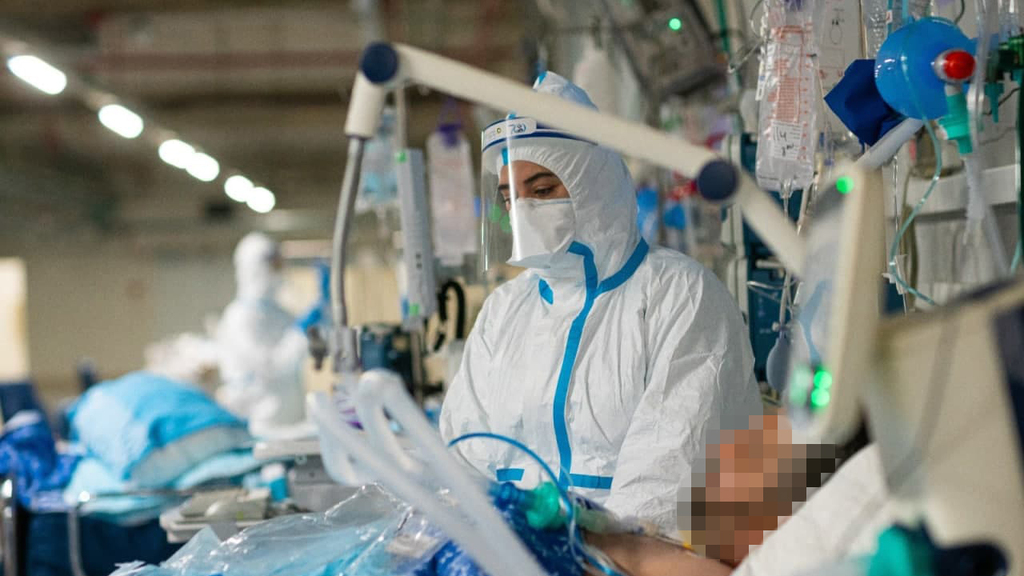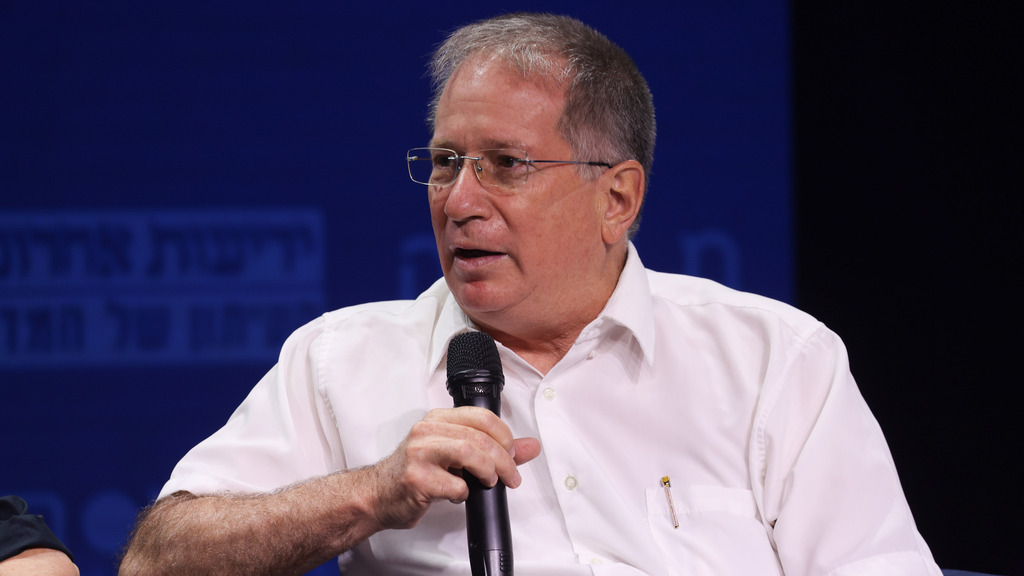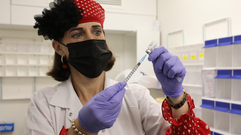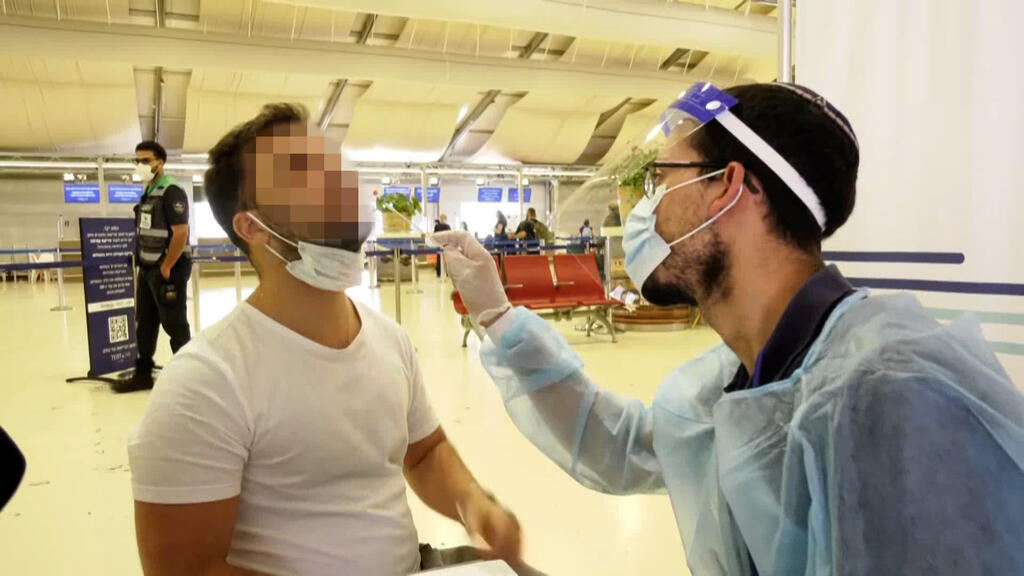A dispute has emerged between health experts over a potential new lockdown next month as Israel struggles to contain a new surge of the coronavirus that has seen the national number of cases soar to the current tens of thousands.
At a coronavirus cabinet meeting convened Wednesday to discuss the rising rate of infection, medical experts warned of hospital capacity being exceeded and advocated for a lockdown in September to halt the spread of the more contagious Delta and Delta+ variants.
4 View gallery


A coronavirus ward at the Sheba Medical Center, Israel's largest hospital
(Photo: Tal Shahar)
The lockdown was backed by Prime Minister Naftali Bennett and Defense Minister Benny Gantz, who said it may be necessary to introduce another lockdown around the time of the Jewish High Holidays in September.
The health experts present cited the lesser financial cost of closures during the three High Holidays, when most Israelis are off work, and said it could lead to a reduction of infection within 10 days and in serious cases within two to three weeks.
But other senior health experts were quick to reject the tentative plan.
"This is not the solution," some experts said, adding that the Health Ministry was viewing the pandemic through a narrow lens, while ignoring other aspects of the crisis.
"Before taking any steps regarding issues of public health, there must be an assessment of the advantages versus possible damage," said Prof. Amos Adler, head of the microbiology lab at Tel Aviv's Ichilov Hospital.
"Now that most of the at-risk population has been inoculated against COVID-19, it is clear from data obtained from around the world as well as our own experience, that a lockdown would be ineffective," he said.
"It would cause damage to all aspects of life," Adler said. "Our advantage today is that we know that though the vaccine does not prevent infection, it prevents serious illness, as the data in the UK also indicates. Even if its efficacy is reduced, we are still better off that we were previously."
Adler also rejected the premise that Israel will soon see 2,000 seriously ill COVID patients.
"How can we assume this will be worse than the third wave of the pandemic, before vaccines were available?" he said.
"I think the government must consider economic aspects and adopt a wider perspective."
4 View gallery


Dr. Michael Halberthal, director of Rambam Health Care Campus in Haifa
(Photo: Yariv Katz)
The director of Rambam Health Care Campus in Haifa, Dr. Michael Halberthal, said the only lockdown that had been effective came the first wave of the virus in 2020 and called the prospect of an additional one ridiculous.
"We saw that the second and even more so the third lockdown were ineffective because the public was not onboard and there was zero enforcement. A lockdown can only work when there is public compliance or strict enforcement," he said.
"I understand the rationale behind the government's concerns and the efforts to slow the spread of the virus, but the response must be to bolster our hospitals' ability to meet the needs posed by the virus and to impose and enforce quarantines on people arriving from abroad," he said.
Prof. Dror Mevorach, who heads the coronavirus response at Hadassah Medical Center in Jerusalem, agreed that the third lockdown imposed in January was ineffective and that said the spread of the virus was actually stopped by the vaccines.
"The solution is getting more people vaccinated against COVID-19," he said.
4 View gallery


A medical professional prepares to administer a third dose of the coronavirus vaccine in Jerusalem earlier this week
(Photo: EPA)
The plan for a September lockdown was also met with resistance from some members of the coronavirus cabinet, although they were concerned with the timing of such a step.
Housing Minister Ze'ev Elkin said the lockdown should be imposed as early as mid-August before the number of serious cases increases further.
"That could ensure a shorter lockdown period," Elkin said.
Interior Minister Ayelet Shaked said the decision regarding the timing of a lockdown must be based on the drive to administer the third dose of the coronavirus vaccine to the over 60s and a push to vaccinate Israelis who had avoided the jabs thus far.
In a meeting Wednesday with hospital directors and senior medical staff, Health Ministry Director-General Nachman Ash said steps must be taken to prepare for the reopening of coronavirus wards and a new reduction in elective medical procedures.
Ash also said the ministry intended to bolster community health services to provide for COVID patients being treated at home.
He told the senior medical officials that hospital staff would be assisted by IDF reservists as was the case in previous waves of contagion and that the ministry was mulling a return to the policy demanding medical staff refrain from overseas travel unless special permission is granted.
Additional steps being considered were an increase in respiratory care training for hospital staff, an increase in staffing for laboratories and a moratorium on visits to patients in hospital wards.
4 View gallery


A traveler undergoes testing for coronavirus at Ben-Gurion International Airport
(Photo: Avi Hai)
At least 280,000 people have already been administered vaccines since the latest drive began last Friday.
Participants in Wednesday's coronavirus cabinet meeting also debated the limit of serious hospitalizations that could affect the level of care, with 1,500 cases seen as the advised limit though up to 1,900 cases could still be handled by hospitals.

